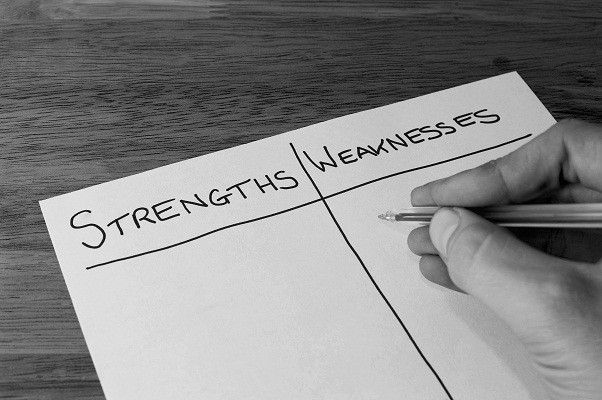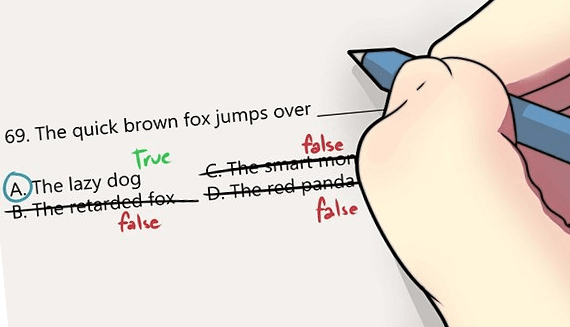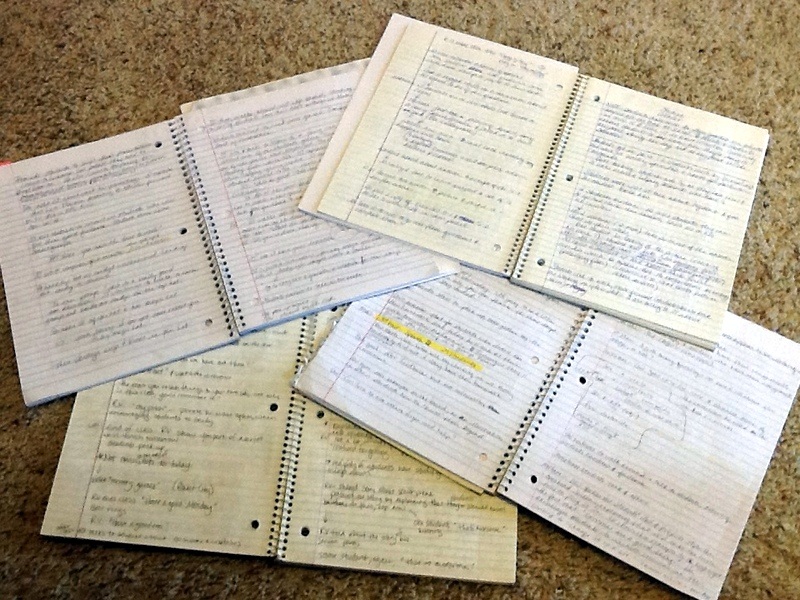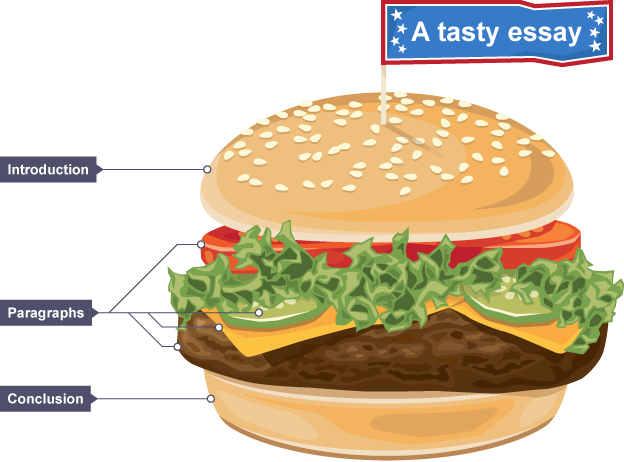
You can probably remember some helpful GRE tips and test taking strategies…
But can you recall each and every one?
Well you are in for a surprise because I have put together the complete list.
Some are mandatory.
Some are unique.
Others are so good that some people try to hide their existence.
But they are all here.
Test Preparation Tips

1. Turn off Your Phone During Study Time: You are not allowed to have a phone in the testing room. So why use one during study time? They are also a huge distraction that does not allow you to focus on your studies.
2. Go Over All of Your Mistakes: Learning from your mistakes is one of the best ways to learn. Go over all of the problems that you missed to make sure you know what mistakes you made and how you can fix them in the future (and hopefully on exam day!).
3. Learn the Section Directions Now: The section directions do not change from exam to exam. Learn them now so that you do not have to waste time reading them on exam day. Use that time to answer more questions.
4. Take at Least 2 Full Practice Exams: Taking practice tests is one of the best ways to study for the exam. Make sure that when you take a full practice exam that you try to simulate test day conditions. This allows you to be more prepared.
5. Practice, Practice, Practice!: Practice makes perfect and that certainly is no different for the GRE test. Most test preparation experts expect you to study for 20-100 hours to prepare for the exam. Studying time is directly correlated with higher exam scores, so study up.
6. Try a Test Preparation Class: Test prep classes are one of the best ways to learn for the exam. Make sure the class that you take is highly reviewed and goes over all parts of the exam. A lot of these classes are great because they give you hints and tips that you will not find anywhere else.
7. Experiment With Different Strategies to Solve Math Problems: Math problems can be very difficult to solve, especially if you are not used to them. The good thing is that many math problems can be solved with different strategies. Make sure to learn the ones that are geared toward your strengths.
8. Get a Test Prep Book: Test preparation books make it very easy to study for the exam. They usually give a detailed outline on what you should study and give practice questions that are very similar to what you will see on exam day. Good thing for you, we have reviewed those here on our site.
See our list of the best GRE prep books.
9. Work on Your Weaknesses Before Your Strengths: It is a lot easier to improve your score from upping your weaknesses than it is by barely moving your strengths. Work on your weak points first for large gains, then work on your strengths for marginal ones.

10. Implement a Study Schedule: Study schedules are essential for staying on task and making sure that you do not fall behind. Make sure that you study schedule gives you time to go over every aspect of the exam and then some. You do not want to be cut short at the end.
11. Diagnose Your Skills Early On: There are tons of diagnostic tests that you can take for the exam that allow you to see what your strong points and weak points are. These are very useful because your weaknesses may not be very obvious. Make sure that you work on your weaknesses first.
12. Use Online Resources: There are tons of free resources online that you can use to study for the GRE. Tons of practice questions and detailed examples are there for the taking. Do not spend your money if you do not have to.
13. Practice Doing Problems Without a Calculator: You are not allowed to use your own calculator for the exam. Make sure that you are comfortable without using one. Also, sometimes not using a calculator is faster than actually using one. Try it out.
14. Practice on a Computer: Since the GRE is normally computer based, practice on a computer. A lot of the online resources can be used in a way that will mimic the actual exam. Use these resources to make yourself comfortable on exam day.
If you do not have a computer, purchase one. You will probably need one for graduate school. See our list of the best laptops for college for tips.
15. Know the Question Types to Expect: The GRE has many different question types for each section. Make sure that you know these question types and which you are good at and bad at. Knowing what you are going to encounter is half of the battle.
16. Do Not Forget to Register: A horrible mistake that you can make is forgetting to register for the exam. Make sure that you register once you begin your study schedule (about 3 months in advance).
17. Practice With Problems at the Edge of Your Ability: Practicing with problems that are too easy wastes your time and practicing with ones that are too difficult is frustrating. Find that middle path and practice with problems that are just beyond your grasp.

18. Teach the Concept to Someone Else: A great way to learn a topic is to teach it to someone else. Grab a study part and teach your strengths to each other. They can give you their tips and you can give them yours.
19. Simulate Normal Testing Conditions: The best way to be prepared for exam day is to know what is coming. The absolute best way to do this is to take your practice exams like they are the real test. You may find out that you need to practice on your stamina because you get tired out after the first 2 sections.
20. Take Breaks When Needed: Always take a break if you feel like you need one. Pushing on through tiredness to study is not very useful because you do not learn nearly as well. Make sure that you are well rested when you study.
General Test Tips

21. Pace Yourself: You want to use your time wisely and not spend it all on any one questions. All of the questions on the exam are worth the same, so don’t spend all of your precious time on just one question.
22. Combine Answer Choice Commonalities to Guess: A great thing to do when you have no clue is to combine answer commonalities to make an educated guess. For example: if the answers are blue cat, blue dog, red cat, and orange owl, then pick blue then because it has the most common parts with the other answer choices.
23. Read the Question Carefully: The GRE will sometimes try to trick you with confusing questions or will try to get you on the wrong trail. Make sure that you read all of the questions carefully before you answer them.
24. Pay Attention to Time Remaining Announcements: It is crucial to know when a section is about to end. Make sure that you are aware of the time remaining and that you do not leave questions blank.
25. There Is Only One Correct Answer: There is only one correct answer for each question so make sure that you can eliminate all of the other answer choices. This is very useful when questions are difficult as many answers will be half right.
26. Every Question Is Worth the Same: Do not focus all of your time on one single questions because they are all worth the same. If you find that you are taking too long, make an educated guess and move on.
27. Eliminate as Many Incorrect Answer Choices as You Can: A good tip for any exam if to eliminate all of the answer choices that you know are wrong. This will help eliminate distractions and allow you to focus on answer choices that are still in the running.

28. Schedule the Test During Hours Normal for You: Make sure that you schedule the exam for a time that is normal for you to be awake. Do not schedule an exam super early just to get it out of the way on that day. This can be detrimental to your score.
29. Do Not Spend Too Much Time on Any One Question: Spending too much time on a single question can be detrimental to your exam score. Make sure to pace yourself and allow enough time to answer every question thoroughly in each section.
30. Cover up the Answer Choices: A good tip for general multiple choice exams is to cover up the answer choices and come up with your own answer without them. Then uncover the choices and pick the one that is closest to your original guess.
31. Do Not Be Paranoid of the Time Remaining: A horrible thing to do during the exam is to constantly be staring at the clock. This can be distracting and can really up your anxiety levels, especially if you are a slow test taker.
Verbal Reasoning Section Tips

32. Simplify Complicated Sentences: A great thing to do while reading is to simplify complicated sentences into easy to digest parts. This can make them a lot easier to understand and will allow you to answer questions more easily.
33. Identify Words or Phrases That Seem Significant: Make sure to underline words or phrases that seem significant to you in a passage. This can be very useful when you need to come back to remember what was said.
34. Try to Find Answer Choices With Words That Match the Passage: A lot of times the correct answer can be found directly from the passage. If a phrase rings a bell in your mind that could mean that it is correct.
35. On Text Completion Questions, Try Filling in the 2nd Blank First: Test completion questions can sometimes be tricky. A good thing to do is to answer the second blank first. This can give you some incites into the first one.
36. For Non-Sentence Equivalence Questions, Eliminate Duplicate Answers: A lot of times on the verbal section of the exam they will give you answer choices that are nearly similar. Since the test makers have to justify their answers, it would be hard for them to justify one answer over another if they are alike. Make sure to eliminate both answers in this case.
37. Look for the Main Ideas of a Passage: A lot of questions in this section will be over the main ideas of a passage, not on specific ideas or phrases. Make sure that you realize the points and purpose of a passage that you are reading.
38. Reread the Sentence Using Your Selected Answer: Sometimes when choosing an answer for a questions, it sounds right in our mind, but not when we say it out loud. Make sure to read completed sentences with your mind and mouth before moving on.
39. Do Not Take Too Many Notes: One thing that can waste a lot of time in this section is taking too many notes. Very few questions will be on specifics in the passages, so do not waste your time taking a lot of notes.

40. Do Not Focus on Studying Vocabulary: Having a large vocabulary is no longer a thing that is tested for on the exam. That expect you to use clues from a passage or sentence to figure out the meaning of a word. Do not waste you time studying vocab.
41. Quickly Remove Irrelevant Answer Choices: A lot of times on the verbal reasoning section the test makes will throw answer choices at you to confuse you. Eliminate these choices so that you are not distracted by their tricks.
42. Use the Context of Nearby Known Words: A lot of times, nearby words or phrases will help you to figure out the meanings of words. Make sure to use this if you do not understand the meaning of a crucial word in a paragraph.
43. Spend More Time on Questions Than Reading the Passages: Try to spend more time on answering the questions instead of reading the passage. Read the passage once and then go to the questions, only coming back to the passage to answer specifics.
44. Read Actively: While you are reading a passage for the first time, try to think critically about what you are reading. This will prepare you for the questions, saving you time, and will not allow your mind to wander, which happens often while reading.
45. Try to Complete the Sentence Without Looking at the Answer Choices: A nice trick to use is to not look at the answer choices before you answer. Pick an answer from your mind and then reveal the choices and pick the one that is closest to your original guess.
46. Make Sure That All Verbs Are of the Same Tense: A common error that is included in answers are verbs that are in the same sentence, but not the same tense. Match sure that all of the verbs match in their tenses.
Analytical Writing Section Tips

47. Use Creative Sentence Transitions: It can be very boring for a test reader to read a paragraph where all of the sentences start with the same word or phrase. Make sure to mix it up so that the readers are not bored.
48. On the Argument Issue, Do Not Tell the Readers Your Opinion: On the argument issue, the readers are not interested in your opinion on a subject. They want to facts on the passage and your interpretation of them.
49. On the Argument Issue, Only Use Information From the Passage: On the argument issue especially, only use information from the passage. The readers do not want to be impressed with what you have learned outside of the exam, they want specific examples from the text.
50. On the Argument Issue, Be Aware of the Writing Style Used in the Sample Passage: It is a good idea to get to know the purpose and reasoning of a passage writer. Are they for or against a topics that they are writing about? Why?
51. Do Not Make Common Grammatical or Spelling Mistakes: Do not make simple grammar and spelling mistakes. Edit your writing at the end and read it carefully to get rid of all of your issues that you may have left.
52. Break up Your Writing Time Into the Writing Steps: Break your writing up into the common writing steps, make an outline, write your rough draft, and then fix it up and edit it at the end. That is how you get a top notch essay score.
53. Avoid Using Slang Words: Do not use slang words on your writing assignments. This can be seen as sloppy and not caring. Make sure that you clean all of them up in your editing process.
54. Use Specific Evidence for Your Issue and Argument: The test readers want to see specific points made and fallacies pointed out from the passage that you are required to read. They want to test you on your analysis and writing skills.
55. Use the Structure of an Essay: To make the essay easy to read for the graders, make sure that there is an introductory paragraph, body paragraph and a concluding paragraph.

56. Body Paragraphs Should Expand on Your Arguments: Your body paragraphs should flesh out your arguments and points. They should be backed up by analysis and fact, not opinions and hearsay.
57. Try to Write a Longer Essay: Studies have shown that writing a longer essay allows you to get a better score on the exam. Make sure that all of your ideas and points are fleshed out and that there are no holes in your arguments.
58. Keep Your Writing Style Simple: Make sure that your writing is not a level higher than what you are used to writing. The graders will be able to tell and will be able to pick out your mistakes. Choose to provide mistake free writing instead.
59. Your Introductory Paragraph Should State the Position You Are Taking: To make your essay easy to understand for the grader, make sure to state the position that you are taking at the start. This makes it easy for the essay to flow and makes it more logical.
60. Analyze and Then Write: Make sure that you flesh out your thoughts and arguments before you actually begin writing. It would be horrible to have a good idea, but not be able to put it into your essay because your previous thought left it out.
61. Avoid Wordiness: Even though a longer essay normally means a better score, that does not mean that you should include filler words. Make sure that all of your arguments and paragraphs have meaning and are not just filler.
62. The Concluding Paragraph Should Summarize Your Point of View: To bring your essay to an end, make sure that your concluding paragraph summarizes your views. The reader may have forgotten some of your arguments, remind them of them.
63. Make Your Arguments Clear and Congruent: You want to make arguments that are fool proof, not ones that can have holes poked through them. Give reasons and facts while your arguments are good and why others are bad.
Quantitative Reasoning Section Tips

Normal Multiple Choice
64. Do Not Ignore Diagrams: Diagrams can sometimes be crucial to understanding a question correctly. Make sure to look at them and understand the story that they are trying to tell.
65. Watch Your Signs and Decimal Points: A common mistake to make on the exam is to mess up your units, signs and decimal points. If you do not get an answer on the first try, check these things first.
66. Work With Small Numbers: A good trick to use on the exam is to make numbers with ending zeros smaller. It is easier to multiply 9×12 than 900×11200. Just remember to add the zeros back on at the end.
67. Draw Pictures: If a diagram is not included with a question, try to make one on your own. Visualizing a question is one of the best ways to wrap your head around a difficult problem.
68. Remember If It Is a Single or Multiple Option Question: Make sure that you know if a question is single or multiple answer. It would suck to do a whole question thinking that it only has one answer, to find out that you missed a step or part.
69. Substitute the Answer Choices Into the Problem: A great trick to use, especially on algebra problems, is to substitute the answers into the equation. You can use the guess and check method to reveal the correct answer.
70. Read Every Question Carefully: On the math section especially, the test writers will try to trick you. Make sure that you read the questions carefully and that you are answering the questions that need to be answered.
71. Try Working With Approximate Numbers: Sometimes an answer does not need to be really specific if the answer choices are far apart, approximations are easier to use and can still give you the correct answer without wasting time.
72. Learn All of the Critical Definitions, Concepts and Formulas: There are many concepts that the GRE tells you that you need to know, like algebra, and the quadratic formula. Make sure that you know these like the back of your hand before exam day.
73. Get Used to Not Using a Calculator: You can use the provided on screen calculator on the exam, but it is not very useful. Try to get used to not relying on one. Once you get good without one, it is normally quicker to do without anyway.

74. Be on the Look out for Tricks by the Exam Writers: The test writers in the math section will constantly try to trick you. If something seems off, it probably is. Make sure that you read all of the questions carefully.
75. Do Not Get Carried Away With Detailed Calculations: Most of the questions on the exam do not require a lot of calculation. If you catch yourself drifting off into large calculations, stop yourself and figure out what the problem really want you to do.
76. Make Sure That Your Answer Is Reasonable: A lot of wrong answer choices can be eliminated because they are not even reasonable. Make sure that your answer choice makes sense in the context of the question.
77. Use Paper for Scratch Work: You can use scratch paper for work, so make sure to make use of it. It can be a lot easier to work on a problem when you can see your work write in front of your face.
78. Substitute Numbers for Variables: A good trick to use on the test is to substitute numbers for variables. The numbers 1 and 0 are great to substitute because they can give you base cases to work off of.
Quantitative Comparison
79. QC Questions Always Have the Same Answer Choices, Learn Them: Quantitative comparison questions always have the same answer choices on every question. Learn them so that you know what to expect on test day.
80. Remember That Geometric Figures Are Not Always Drawn to Scale: In the QC section, geometric figures are not always drawn to scale. Do not let this distract you from the true correct answer. Just because it looks right does not mean that it is.
81. Simplify the Comparison: A great trick to use is to simplify the comparison. Make sure that you break it down into simple terms so that you can easily answer it.
Data Interpretation
82. Note the Relationships Between Variables and Trends: A lot of the questions revolve around the relationship between variables and their corresponding trends. Make sure that you know how they relate.

83. Focus on What You Need to Look for in the Charts/Graphs: A lot of the charts and graphs will have more information than you need. Make sure that you know what you are looking for before you dive in.
84. Rely on the Visuals: The visuals are there to help you. Do not ignore them. A lot of the graphs and charts give you tons of information to help you answer the problems.
85. Breakdown Complex Figures Into Smaller Shapes: A lot of times the figures will be big, bold and confusing. Try to break them down into smaller pieces to get a grasp on them.
86. Ask What Story That the Data Is Trying to Sell: A lot of questions on this section of the exam will be about the story or meaning that the graphs tell. While looking at the figures, try to figure out the story they are telling.
87. Double Check Your Units: A lot of the charts and graphs will have different units. Make sure that you do not mess these up! A psi and a Gpsi are not the same size and can lead to the incorrect answer.
88. Know What Question You Are Trying to Answer: Sometimes it can be confusing to have many charts and graphs interceded with questions and passages. Make sure that you are answering the correct questions.
89. Read the Questions Before Looking at the Figures: Always take a glance at the questions before looking at the figures. This will give you a better understanding about what you should be looking for. Don’t get distracted by info that you do not need.
Night Before and Day Of Tips

90. Do Not Cram the Night Before: Cramming the night before the exam can be a detrimental mistake. You should know everything that you need to know well before this.
91. Leave Your Cell Phone in the Car: You are not allowed to have your cell phone in the exam room, so leave it in your car or in your assigned locker. Do not get your exam taken away because you are careless.
92. Remember Your Body Language and Posture: Your body language and posture has a big effect on how alert and awake you are on exam day. Make sure that you sit up/stand up straight and are not slouching.
93. Bring Your List of Targeted Universities: At the end of the GRE you are asked to give a list of schools that you would like to have your scores submitted to. Make sure that you know which ones that you have in mind.
94. Bring a Drink: Are are not allowed to have a drink inside of the exam room, but you can have one during breaks. Bring one along just in case you get thirsty.
95. Get To the Test Site Early: Make sure that you get to your testing location early. These relieves tons of stress since you know that you will not be late, ruining your day.
96. Stretch During Exam Breaks: Stretching allows yourself to release tension and ease your nerves. Make yourself stretch during every break.
97. Avoid Screen Time the Night Before: Blue light from screens has been shown to throw off our sleep schedule. Make sure to turn off all electronic screens an hour before bed time. You can read to get some entertainment.

98. Bring More Than One Pencil: Sometimes the pencil that you bring breaks or malfunctions, make sure that you bring extras in case the test center has bad pencils.
99. Bring a Snack: You are not allowed to have a snack in the testing room, but you can have one during breaks. Bring one along and store it in your locker in case you are hungry.
100. Get a Good Night’s Sleep: Getting a good nights sleep is crucial to being awake and alert on exam day. The more alert you are, the better your score will be and the faster you can plow through questions.
101. Steer Clear of Nervous People: Nervous people can bring bad energy which can rub off on you. I know this can be fringe thinking, but you don’t want to risk it for this important test.
102. Bring Your Photo ID: The testing center needs to verify who you are, so make sure to bring a photo ID. Do not forget it!
103. Bring Layers: Sometimes the testing center can be too hot or too cold. Bring layers so that you can take them off if it is warm and put them on if it is cold.
104. Pack Your Things the Night Before: To ease that last minute rush on exam day, pack your things for the exam the night before. You won’t be running around the morning of trying to find things that are missing because you did it the night before.
105. Have a Good, Healthy Breakfast: A good, healthy breakfast allows to you get your energy up for the exam. Having high energy means that you can answer questions quicker and won’t be under a time crunch.
106. Make a Plan to Get to the Test Site: Sometimes testing centers can be out of the way or in weird areas. Make sure that you know how to get there before you leave the morning of the exam.
107. Go to the Bathroom Before the Exam: Make sure that you go the the bathroom before you go to the testing room. You can go without breaks for a while and do not want to be stuck while you really need to go.
Have Any Other Tips?
If you happen to have or know any other tips not mentioned here, please leave them in the comments below.
I hope to update this list from time to time in the future with new tips and test taking strategies that the readers think up.
GRE Tips: Reviewed
| GRE Section | # of Tips | |
| 1 | Verbal Reasoning | 15 |
| 2 | Analytical Writing | 17 |
| 3 | Quantitative Reasoning | 26 |
| 4 | General | 49 |
Leave a Reply